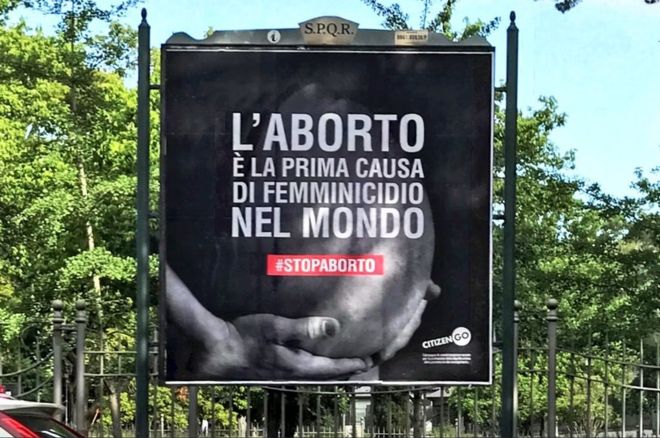Originally posted at BBC on May 15, 2018.

“Abortion is the prime cause of femicide in the world,” declare the black-and-white posters that have appeared in several areas of Rome.
But the campaign has provoked widespread anger and led to appeals to the mayor to get the posters removed.
One feminist group condemned the posters as “disgraceful” while others objected to the use of a word often used for the killing of women by men.
Italy is about to mark 40 years since abortion was made legal.
The Madrid-based CitizenGo group behind the posters timed the campaign to coincide with the 22 May anniversary of Italy’s Law 194, as well as a “march for life” in the centre of Rome on Saturday.
In a series of messages on social media, it said that after 40 years the law had failed and that abortion was often used to suppress women, leaving “millions of babies killed and women injured”.
This is not the first time anti-abortion groups have highlighted the impending anniversary of the law. Only a month ago Rome authorities removed a giant poster of a foetus that bore the slogan: “You’re here because your mum didn’t abort you.”
How have Romans reacted?
Among those protesting against the new campaign was local authority leader Francesca Del Bello, who said the posters were “offensive to every woman, especially for those who had the difficult experience of abortion or violence”.
Writer and broadcaster Selvaggia Lucarelli went on Twitter to say: “How sad to use the term ‘femicide’ in a vile way with the clear aim of attracting attention to a campaign against abortion.”
Feminist group Facebook Rebel Network called on Mayor Virginia Raggi to remove the posters immediately.
However, campaigners hit back saying that all those who had insulted the CitizenGo group had been able to do so only because they had not been aborted themselves. Their campaign would soon spread to other cities, they said.
What is Italy’s abortion law?
Under Law 194, which came into force in May 1978, abortion is legal in the first 12 weeks of pregnancy.
After that time it is allowed only if the life of the mother is at risk or there is a foetal abnormality or malformation.
If there is a chance the foetus can survive outside the womb, termination is lawful only if pregnancy or delivery is a serious risk to the woman’s health.
Abortion is also a major political issue in Ireland, where voters will be asked on 25 May if they want to continue the country’s near-total ban, or allow terminations in the first 12 weeks of pregnancy.
Italy is a predominantly Catholic country and a large proportion of doctors refuse to carry out terminations.
In 2016, the family of a woman who died after a miscarriage in Sicily accused a doctor of refusing to abort because he was a “conscientious objector”. That case is still going through the courts.
In recent years the number of voluntary terminations has fallen significantly in Italy.
In 2016, there were 84,926 terminations, 3.1% down on the previous year. The highest number recorded was 234,801 in 1982.
